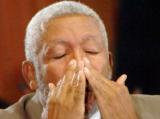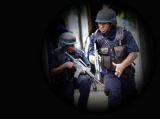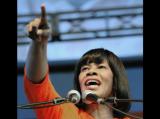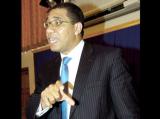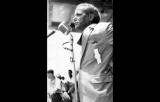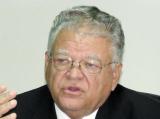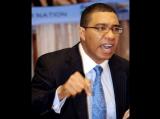Columns By Category
Popular Articles
- THE REALITY OF TACKY AND SAM SHARPE
- PLEASE DON’T BETRAY US AGAIN POLITICIANS
- CRY, MY MURDEROUS COUNTRY
- MODERNIZING THE PNP: VERSION.2020
- IS THE EXCHANGE RATE ON TARGET OR IS IT A WHOPPER?
- CARICOM: BEACON OF DEMOCRACY OR COWARDLY DISGRACE?
- DEMOCRACY PREVAILS IN THE UNITED STATES
- THE CRIME STATISTICS SPEAK FOR THEMSELVES
- PETROJAM, OIL PRICES, AND THE $7 TAX
- Kevin O'Brien Chang | Brains, not brutality – smart(phone) crime fighting
- TERRORISM IN JAMAICA
- STOP CURRENCY CRISIS TALK
- 'CASTIGATED KD' AND THE 9 YEAR WONDER
- GET PAST MERE TALK ON DONS AND GARRISONS
- LOW VOTER TURNOUT MYTHS AND ELECTION PREDICTIONS
- HOW GREAT CAN BROGAD BE?
- PNP WAS SOCIALIST FROM THE START
- AN AGE AND GENDER RE-ALIGNMENT ELECTION?
- Most influential Jamaican of 2010-2019?
- NO GAYLE, NO RUSSELL, NO TALLAWAHS
Politics
Mout' Mek Fi Talk!
- Article
- February 27, 2011
- No comments
Question: Will Jamaica ever experience a people-power revolution à la Tunisia and Egypt?
Answer: Yes, when hell freezes over.
Since the first in 1944, Jamaica has held 13 universal adult suffrage general elections. Six of these were won by the party in power, six by the opposition, and in 1949, the incumbent party won the most seats but lost the popular vote. There have been no assassinations, coups, or revolutions. Not once has the legitimacy of an elected government ever been challenged. Post-World War II, no country on the planet can boast a better democratic scorecard.
Good Ad for Democracy
- Article
- February 13, 2011
- No comments
Enquiry, shamquiry. That was pretty much the initial attitude of the general public towards the ongoing Manatt-Dudus commission. Not only have we grown accustomed to enquiries costing taxpayers lots of money and producing nothing of value, but the relentless press coverage of the Manatt saga over the past year left most people utterly sick of the topic.
The early stumblings suggested a grand 'business-as-usual' waste of time. But the fitful stops and starts began to curiously coalesce into rather interesting courtroom theatre, and what started out as a tedious joke is becoming a pretty good advertisement for Jamaican democracy. Chairman Emile George left the gates a bit hesitantly, but has settled into a firm non-partisan stride, quickly quashing the constant efforts to politicise the proceedings.
See No Evil Hear No...
- Article
- January 23, 2011
- No comments
In the seven months since Christopher 'Dudus' Coke was extradited and his Tivoli stronghold dismantled, the homicide rate has plummeted by 35 per cent. No doubt, the uncompromising manner in which police now deal with persons of interest has contributed to the decline.
While Commissioner Owen Ellington's aggressive targeting of corrupt cops, and the efforts to improve police and community relations, seem to be bearing fruit. Jamaica remains one of the most murderous countries on earth.
Broken Promises, Purposeless Opposing
- Article
- December 10, 2010
- No comments
Generational Politics
- Article
- November 14, 2010
- No comments
Norman and Busta; Edna and Gladys
- Article
- October 17, 2010
- No comments
This is an extract from 'Jamaica Fi Real: Beauty, Vibes and Culture' by Kevin O'Brien Chang. Published by Ian Randle Publishers, available at the end of this month.
Though they had a common grandmother, Alexander Bustamante and Norman Manley were very different. Bustamante was a rough and ready man of the people with little formal education, and made no major mark on the world until he had passed 50. For Manley, achievement of excellence was the norm. He was an outstanding high-school athlete, Rhodes scholar, decorated First World War-military hero, prize man of Gray's Inn, acknowledged as the Caribbean's finest legal mind and the first Jamaican to appear before the Judicial Committee of the Privy Council.
Can the JLP Learn from History?
- Article
- October 10, 2010
- No comments
In september 2007, the Jamaica Labour Party (JLP) triumphed in a contested general-election victory for the first time since 1980, and tasted real political power for the first time since 1989. You would think that droughts of such durations would make Labourites wary of falling into the same traps that kept them so long in the wilderness. But recent events make you wonder.
PNP Unity, JLP Rift and a Generational Divide
- Article
- September 26, 2010
- No comments
To those who believe that a strong democracy requires a strong opposition, last Sunday's vibrant People's National Party (PNP) conference was a very edifying sight. There was a large and enthusiastic crowd, it was incident free, and Portia Simpson Miller gave perhaps her best-ever public performance.
A Battle for the Soul of the JLP?
- Article
- September 19, 2010
- No comments
An old British political joke goes like this: An old hand invites a newly elected member of parliament to sit with him in the front bench for the opening of Parliament. As the opposing party files in, the newcomer mutters, "Here comes the enemy!" The veteran sharply upbraids him. "Not so, young man! That is Her Majesty's loyal opposition!" And with a quick glance over his shoulder, he remarks "The enemy is behind you."
Betrayed - Politicians Fail People Again
- Article
- July 25, 2010
- No comments
Those who say the recently ended state of emergency (SOE) served no real purpose must place little value on human life. From January 1 to May 31, Jamaica experienced 737 murders, or 4.8 per day. Between June 1 and July 19 there were 137 murders, or 2.8 per day. That is an over 40 per cent drop. Had the January to May rate continued, June and July would have seen 238 murders. This means probably 101 Jamaican lives were saved over 49 days.


